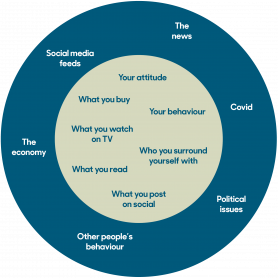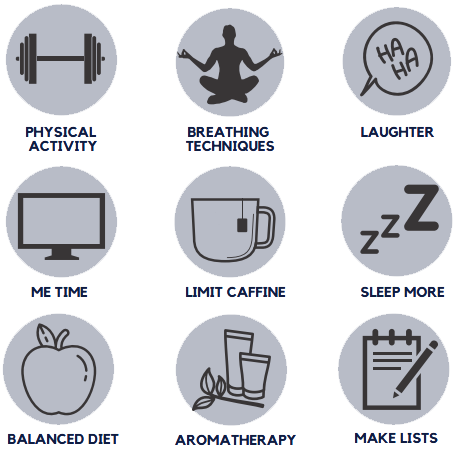Stress and Burnout
Posted on Thursday, 5 October 2023 under Wellness
Stress is defined as a state of mental or emotional strain or tension resulting from adverse or demanding circumstances.
Stress is made worse when we feel like we don’t have control over things going on in our lives. And we’ve all had plenty of that with the challenges most of us have experienced during the last 2-3 years for a wide range of reasons including being sick, caring for sick people, working from home, not being able to work, not being able to connect with family and friends for long periods, increasing prices of petrol and groceries and the list goes on.
Here are some practical steps and tools we can take to help reduce worry and stress and to take control of the things we can control:
Circle of Influence:

When we’re thinking about how we can deal with stress, it’s important to break it down into what we can and can’t control or have influence over. In many instances, during the last few years, the only thing we can control is our response to what’s occurring.
Ways to manage stress and reduce its effects:
 There are many ways to manage stress, it's about finding what works for you. For some, exercising is the best way to manage stress as your body releases endorphins that interact with the receptors in your brain. But there are other things you can try.
There are many ways to manage stress, it's about finding what works for you. For some, exercising is the best way to manage stress as your body releases endorphins that interact with the receptors in your brain. But there are other things you can try.
Overcoming overthinking
When we step back and look at situation objectively, we find that a lot of our stress is self-created. Over-thinking the “what if” situations can drag us down.
Getting our thoughts down in black and white can help reduce stress/worry and focus us on the things we can control.
Here are some questions we can answer to get clear on what’s real and what’s not, and what we have control over.
- It is true? Is it fact?
- Where’s the evidence?
- What’s the percentage likelihood of it occurring?
- If it happened, how would I respond?
- When have I successfully handled something similar before?
- Is this thing I’m worried about my responsibility?
Breathing
Deep breathing can help you stay calm in a stressful situation. Using these simple techniques, you can begin to use your breath to lessen your stress responses. If you are pregnant or suffer from health problems, consult your doctor before trying any deep breathing exercises.
Pursed Lips Breathing
This breathing exercise helps to slow your breathing rate and allows you to take in more oxygen. This exercise help with anxiety and it may also help you breathe more easily during exercise if you do it before or after you exercise.
- Inhale through your nose for 2 seconds
- Purse your lips as though you were blowing out a candle
- Exhale through your pursed lips for 4–6 seconds
- Repeat several times until you feel your breath slow down
4–7–8 Breathing
- Sit upright with your back straight
- Place the tip of your tongue on the roof of your mouth, closer to your teeth
- With pursed lips, as though you were blowing out a candle, exhale making a whoosh sound
- Close your mouth and inhale through your nose for 4 seconds
- Hold your breath for 7 seconds
- Exhale completely through pursed lips for 8 seconds, again making a whoosh sound
- Repeat three more times
Pocketbook
Below is a handy pocketbook which outlines the mental health continuum model, tools for managing challenges, advice on how you can support others, and links to other useful websites.




